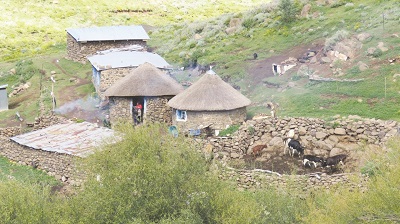By Lesira Rampa
MASERU – As far as development is concerned, there is often a rising concern surrounding its fair distribution. In the landlocked country of Lesotho- often celebrated for its tranquillity and natural beauty, there is a scourge of negligence that infiltrates the lives of many that reside in rural areas. While development efforts have primarily focused on urban centers, the rural areas of Lesotho have for a long time now been disregarded. Socio-economic development and technological advancement are as imperative in rural areas as they are in urban areas.
Beyond Lesotho’s picturesque facade, there is a battle between the flourishing city of Maseru and the rural areas which are often left in drenches of limited infrastructure and limited resources. Imagine a world where a simple trip to the market becomes an arduous journey, where settlers yearn frequently for accessible roads to connect them to vital services .The Lesotho’s uneven terrain though breath-taking and beautiful, does prove a challenge to many residents; creating a huge barrier from the opportunities and services alike that lie beyond their village boundaries. Unfortunately, even their pursuits to better their lives such as finding markets for their hard earned produce are often in vain.
Lesotho is an example where despite possessing abundant water resources, there are still difficulties in ensuring water availability for its settlers in the rural areas. Water is the most basic of human needs and its insufficiency within these areas has put Basotho at risk of waterborne diseases –which is not only devastating but also fatal. Since the industry that most rural settlers rely on is agriculture, it suffers most due to inadequate water supply .It is no wonder Lesotho faces social inequalities , social division and deepens a sense of injustice within the affected populations.
The balance between both rural and urban areas promotes sustainable growth. It is no secret that there is overcrowding in urban areas as some of the Basotho population make their way in them to seek greener pastures. Therefore by investing in rural areas such as infrastructure development and agricultural modernization – it inevitably leads to unlocking the potential of Lesotho’s rural economy. To promote rural development in Lesotho, it is crucial to empower local communities. This can be achieved through providing better access to agricultural training and supporting farmers with modern technologies regardless of their settings. Additionally, this is better attained through participatory decision-making processes that involve community members in identifying their needs, setting priorities, and implementing projects. By nurturing local leadership, fostering entrepreneurship, and providing access to education and training, rural communities can become self-reliant and contribute significantly to the country’s development.
One of the untapped avenues for Lesotho’s economic growth is cultural tourism, and rural areas being rich in natural beauty- cultural heritage and traditional practices are still practiced in these areas as compared to urban areas where culture is highly overlooked and is slowly diminishing. Investing significantly in rural tourism infrastructure and community based tourism puts Lesotho in a better position to attract tourists and to better preserve the Basotho culture. While cities are undoubtedly vital economic hubs, rural areas have their own unique contribution to make and rural tourism practices that embrace the encouragement of rural settlers to pursue traditional handicrafts to display in museum houses within their villages can create jobs and preserve natural wonders for generations to come. Shouldn’t rural residents have access to the same opportunities as their urban counterparts?
To quickly rise above another conundrum of lack of electricity which is still a problem in many of the villages in the highlands of Lesotho, the government can actuate private investment ,promoting public –private partnerships to make energy access more viable .Additional solutions include off grid power solutions like being provided with mobile charging stations equipped with solar panels or alternative energy sources that can ensure access to communication and information technology for rural population.
The evident social inequality between the residents in rural areas – especially youth and those residing in the urban parts of Lesotho boils down to unequal distribution of information. Often times the urban settlers appear more knowledgeable and with an intense keen attitude towards embracing diversity and advancement. The fostering of awareness programs would help remedy this imbalance. That is far more the implementation of educational initiatives that focus on enhancing knowledge, skills and the emphasis on the importance of broadening horizons and engaging with the global community. Providing mentorship programs and connecting rural youth with successful individuals from diverse backgrounds can also inspire them to foster character development, personal growth and help envision and pursue meaningful goals.
The issue of redirecting development to rural Lesotho underscores the crucial need to address the excessive complaints expressed by rural settlers .It is disheartening to observe the lack of practical assistance provided to these communities .Yet in these intricate landscape of challenges, lies an opportunity for all stakeholders to unite and craft a vibrant resolution for the underdevelopment in rural areas. Governments, non-governmental organizations and private entities should intertwine their resources, efforts and expertise to paint a brighter future for the forgotten corners of Lesotho’s countryside.


